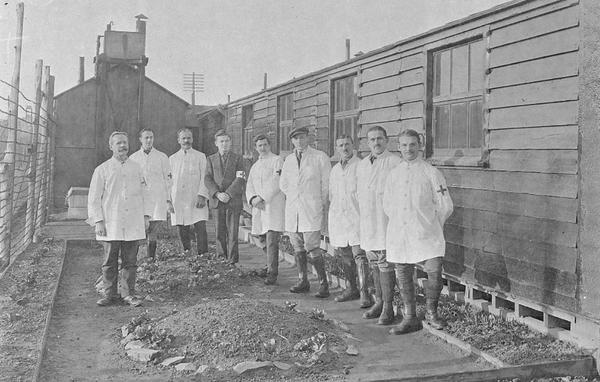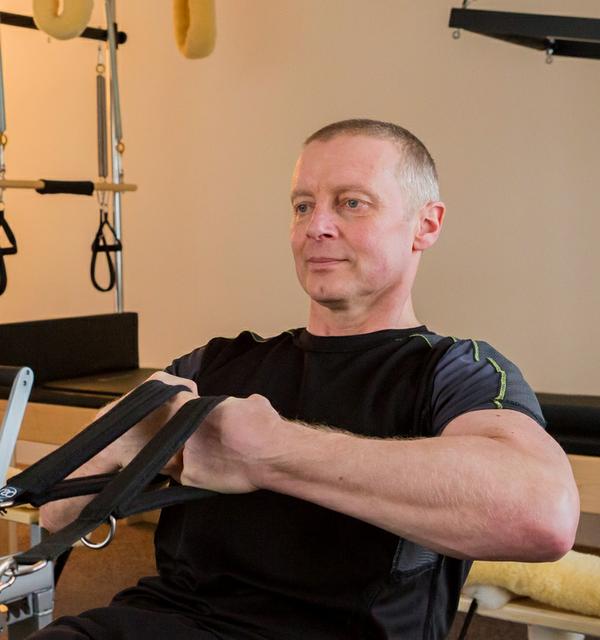(Brett Miller -Pilates Intel)
"I am very fortunate to live on a wonderful, scenic and peaceful island called the Isle of Man. However, when Joseph Pilates spent 3½ years on the island from late 1915 to early 1919, he was strictly confined within the largest internment camp built for First World War “enemy aliens” and would not have enjoyed quite the same benefits of island life as I do today.
Knockaloe Internment Camp, where Joseph was held (along with my own great-grandfather) has been “well described by a visitor as being like a glorified chicken run. Not only were the huts suggestive of enlarged hen-houses, but the aimless wandering of the men round and round the compounds, in dust or in mud, according to the weather, brought to mind the scratchings of cooped chickens in their already well-scratched-over soil.” (“St Stephen’s House, Friends’ Emergency Work in England 1914 to 1920” by Anna Braithwaite Thomas and others)
Approximately 23,000 men were held at the camp within an area covering only 22 acres (this is less than 17 football/soccer fields). At the outbreak of the war, Britain was a very different place than it is today and attitudes to German, Austrian, Italian and Turkish (described at that time as “enemy aliens”) were very strong. Joseph arrived by boat on the island in the dark of night when locals were less likely to see the new internees. He was then transported by steam train to the camp, to awake the next morning enclosed within his new barbed wire-surrounded home.
How did Joseph deal with the challenges he faced during that time? Lolita San Miguel (first generation Pilates teacher certified by Joseph Pilates) recounted to me that Joseph did not speak much of his time on the island. However, she remembered that when she did ask him about it, he always said that he was actually very glad for the time he spent on the Isle of Man as it gave him the time and opportunity to work on his method, which he may not have otherwise had.
Joseph displayed an admirably positive attitude in the midst of a very tough situation. His confinement was overshadowed with no knowledge of the future outcome or duration of the war, coupled with severely restricted food and resources. The living conditions were not pleasant and men were dying around him, not only from illness, but as Joseph observed, from lack of hope and stimulation in life. However, Joseph used the time as an opportunity to develop his method towards radically improving the lives of the sick, injured and increasingly hopeless men around him.
Knockaloe Camp was divided into four camp areas (camps 1-4) and movement between camps was prohibited unless special permission was granted by the Camp Commandant. Each camp had its own hospital unit. Joseph Pilates was held in camp 4 therefore he may well have worked in the hospital unit of camp 4, but it is also possible (although not proven) that he could have been granted permission to work in other camp hospitals.
After looking through the many digital images of unnamed internees at the Isle of Man Museum, I stumbled across a photograph which shows an internee hospital orderly with army and civilian medics either side of him. The internee in the picture bears a remarkably strong resemblance to Joseph Pilates and was taken outside camp 2 hospital. In that day, the norm was to wear a moustache, although Joseph never did. The wave of the man’s hair and his stance is notably similar to pictures of Joseph outside his internment. If the internee in the picture is Joseph, then he clearly worked in the different camps, and was well respected to have been the only internee in the picture.
There is little evidence to substantiate the stories that surround Joseph’s time at Knockaloe. However, there are some significant and key statements reported as being made by Joseph himself. To my knowledge, none of those statements were ever disputed by any of the many men who were interned and lived through those challenging times alongside him.
Within an article by Doris Hering which appeared in Dance Magazine, February 1956 (p.76) entitled “They All Go to Joe’s”, referring to Joseph’s time in the camp: “There he encountered people who were disabled as a result of wartime diseases and incarceration. He began devising machines to help in their rehabilitation.”
In 1962, Robert Wernick interviewed Joseph Pilates for Sports Illustrated magazine where Joseph stated that “the full principles of Contrology were revealed to him during World War I”. The article went on to state “[Joseph] began demonstrating these exercises to the dejected figures around him, and since they had nothing else to do, they began to do the exercises too. Awkwardly and timorously at first, but under his firm supervision they became more and more confident, more and more bouncy, like cats. They ended the war in better shape than when it started.”
The letter to Joseph Pilates which appeared in Return to Life through Contrology included the following excerpts: “To our friend, Mr Pilates, professor and instructor of physical education, always willing”; “the most unselfish during four and a half truly horrible years”; and “relying on his training we ought to feel fit, physically and spiritually, to the end”.
Could he have used springs from beds to develop rehabilitation equipment? Yes, of course he could. I have tested the theory and it works. Whilst no evidence exists that the hospital bed frames had springs which Joseph could have utilised, there is no evidence either to the contrary. Every Victorian/Edwardian era bed I have seen, especially those referred to as a ‘hospital bed’ have had springs attached at one or both ends of the bed frame.
Life at Knockaloe Camp is being fully researched and documented by a charitable trust (www.knockaloe.im) and their important research is helping to bring the story to life. The charity intends to have a museum and visitor centre opened by April 2018 where there will be a lasting record of what life was like in the camp, detailing the hardships and the life internees endured. Within the visitor centre, it is fitting that there will be a special section about Joseph Pilates in the place where he not only developed the foundations of the Pilates Method, but he was stirred deeply by the needs of men suffering around him. He led men who were waning physically, mentally and emotionally to move and be active; enabling them to survive, recover and make the most of the bodies and minds they had while freedom, food, hope and contact with the outside world remained restricted.
The life-enhancing benefits we experience and share each day, when we practice or teach Pilates, are thanks to an incredible German-born man, who faced some of the most serious hardships during his life - not only in childhood, but also as an adult. It is a story of triumph over adversity and of will, determination and strength of spirit as well as of mind and body which should be remembered as part of our Pilates Heritage.
Jonathan Grubb was born in England in 1962 and has lived on the Isle of Man since he was two years old. His great grandfather Jakob Grub was interned on the Isle of Man until 28 August 1919 in the same camp as Joseph Pilates.
In his younger days Jonathan was a keen amateur sportsman and particularly excelled at football (soccer), representing the Isle of Man in international games on numerous occasions. An anterior cruciate ligament injury sustained towards the end of his playing days led him to discover Pilates and he has been a passionate practitioner ever since. He has traveled to various countries to attend conferences and courses and been fortunate to be mentored by very experienced local teachers.
Having previously been an advanced instructor for several years in the Wu family style of tai chi chuan, Jonathan is currently studying to become a Pilates teacher with MKPilates and his teaching has been enthusiastically welcomed in classes throughout the island already. More on the story of Knockaloe Internment Camp can be found at knockaloe.im

